If your boiler isn't registered, you face serious safety hazards like gas leaks and carbon monoxide poisoning. You could also encounter legal penalties, including fines and possible shutdown orders. Insurance claims can be denied due to non-compliance, leaving you financially responsible for any damages. In addition, maintenance becomes challenging as many service providers won't work on unregistered systems. Understanding these risks is essential, and more details will help you navigate the implications effectively.
Key insights
- Unregistered boilers may malfunction, leading to gas leaks, explosions, and carbon monoxide poisoning due to lack of safety oversight.
- Operating without registration can result in legal penalties, including fines and shutdown orders from regulatory authorities.
- Insurance claims may be denied for incidents involving unregistered boilers, leaving the owner financially responsible for repairs and damages.
- Maintenance and inspection become challenging, as service providers often require registration documentation to perform necessary checks.
- Non-compliance can lead to significant financial consequences, including increased insurance premiums and operational downtime costs.
Safety Hazards Associated With Unregistered Boilers
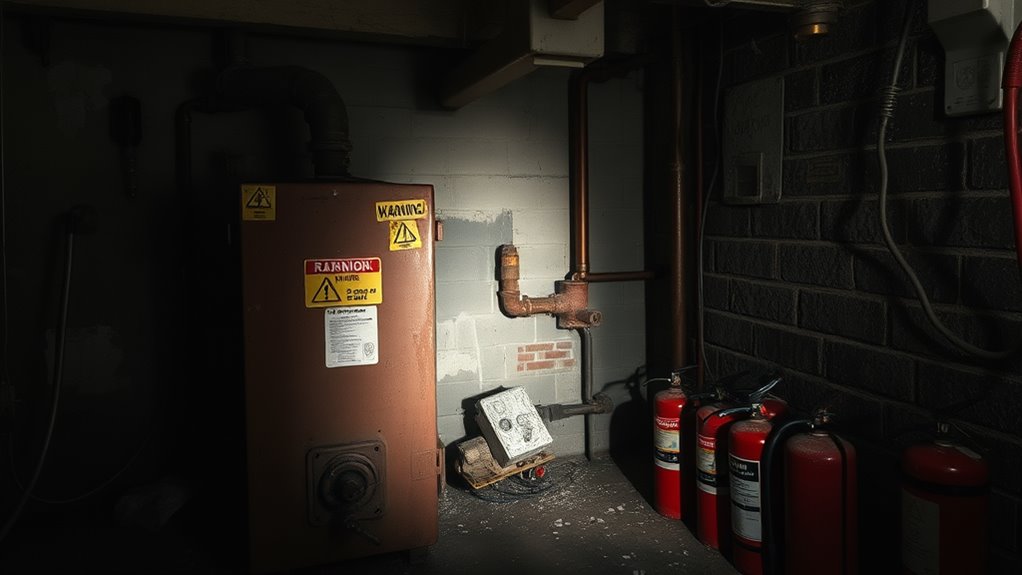
When you operate an unregistered boiler, you expose yourself to significant safety hazards that could endanger both your property and personal well-being. Unregistered boilers often lack compliance with safety regulations, increasing the risk of malfunctions and accidents. These units may not undergo regular boiler inspections, which are vital for identifying potential issues before they escalate into dangerous situations. Without proper oversight, you might face risks like gas leaks, explosions, or carbon monoxide poisoning. Additionally, the absence of safety measures can lead to inefficient operation, raising energy costs and contributing to environmental harm. Prioritizing registration guarantees your boiler adheres to safety standards, ultimately protecting you and your property from potential disasters. Furthermore, obtaining a Commercial Gas Safety Certificate ensures that your boiler has been inspected by qualified professionals, confirming its compliance with necessary safety regulations. Don't underestimate the importance of following regulations for your boiler's safety.
Legal Repercussions of Failing to Register
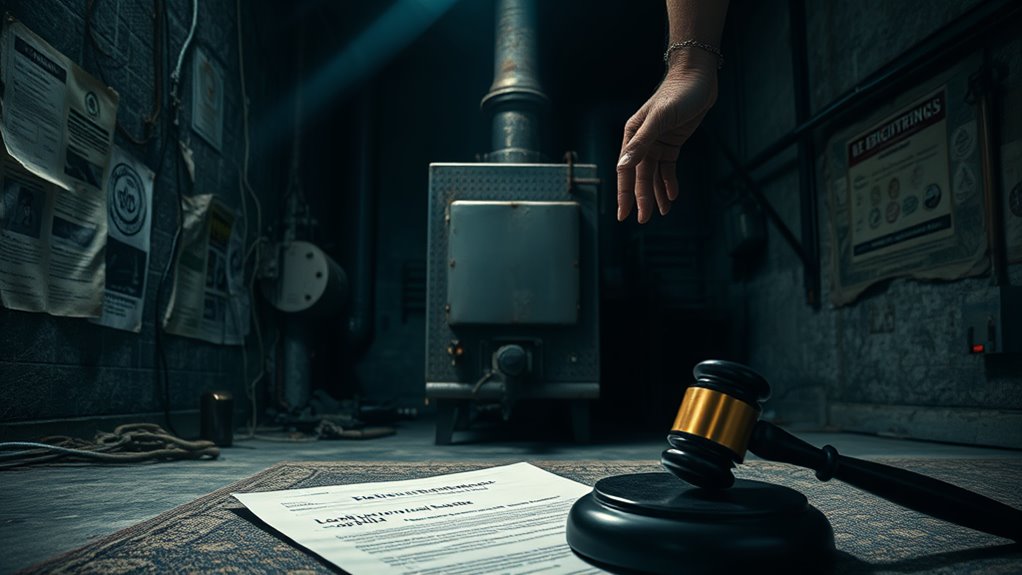
Operating an unregistered boiler doesn't just pose safety risks; it can also lead to significant legal consequences. Failing to register your boiler can result in severe legal penalties, including fines and potential shutdown orders from regulatory bodies. Compliance with local and national regulations is mandatory, and neglecting this duty undermines the legal framework designed to guarantee safety and efficiency. If authorities discover your unregistered boiler, you may face inspections, which can further escalate penalties. In some cases, repeated violations can lead to criminal charges or liability for damages caused by boiler malfunctions. To avoid these repercussions, verify your boiler is properly registered and meets all regulatory compliance requirements. Taking this proactive step protects you legally and enhances overall safety. Regular servicing ensures gas safety compliance, which is essential for avoiding legal issues related to boiler registration.
Impact on Insurance Claims
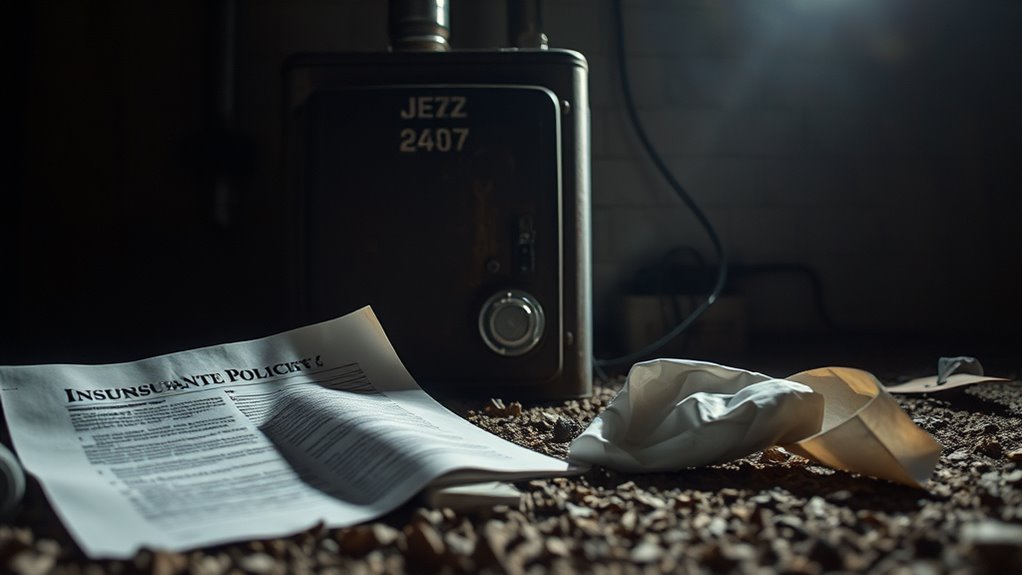
Failing to register your boiler can considerably impact your insurance claims. When you don't register, you risk gaps in your insurance coverage that could lead to significant financial consequences. If a boiler-related incident occurs, your insurance provider might deny your claim, citing non-compliance with registration requirements. This claim denial can leave you responsible for costly repairs or damages that would otherwise be covered. Additionally, insurers may consider unregistered boilers as a higher risk, which could affect your premiums. To guarantee you maintain adequate protection and avoid complications during claims, it is crucial to register your boiler promptly. Regular maintenance of equipment is essential to ensure compliance and reduce risks associated with unregistered boilers. Don't let a simple oversight jeopardize your financial security and peace of mind.
Maintenance and Inspection Challenges
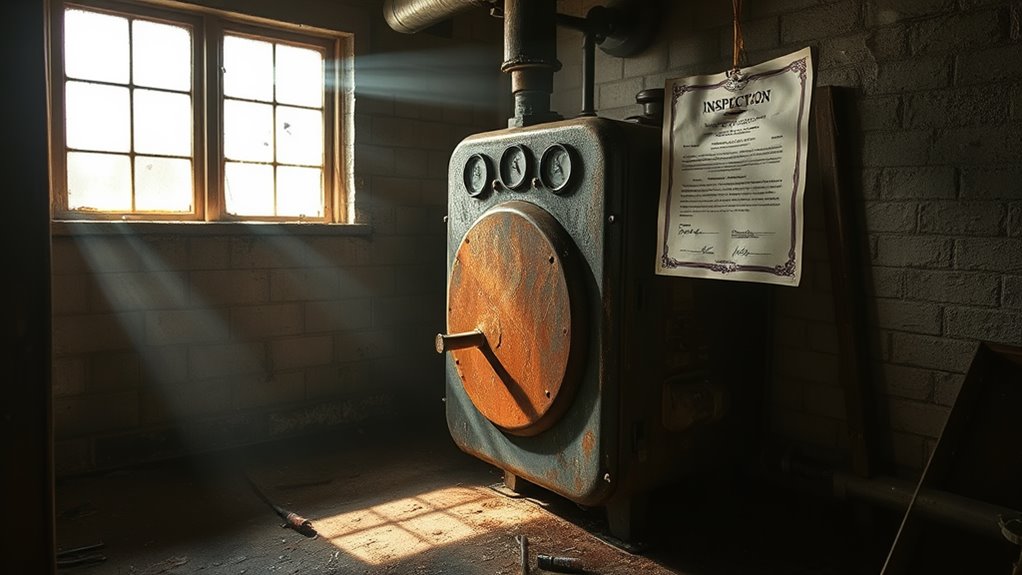
Neglecting to register your boiler can lead to significant maintenance and inspection challenges that might compromise its efficiency and safety. Without proper registration, you'll likely face difficulties in adhering to maintenance schedules, as many service providers require documentation to perform necessary inspections. This lack of accountability can result in missed maintenance, ultimately diminishing your boiler efficiency. Additionally, unregistered boilers may not meet regulatory standards, making it harder to identify potential issues before they become serious problems. Regular checks are essential for maintaining peak performance, and without a registered boiler, you may struggle to find qualified technicians willing to service your system. Prioritizing registration guarantees you can maintain compliance and safeguard your boiler's longevity and functionality. Moreover, regular maintenance is crucial for heating system efficiency, ensuring that potential issues are addressed before they escalate.
Financial Consequences of Non-Compliance
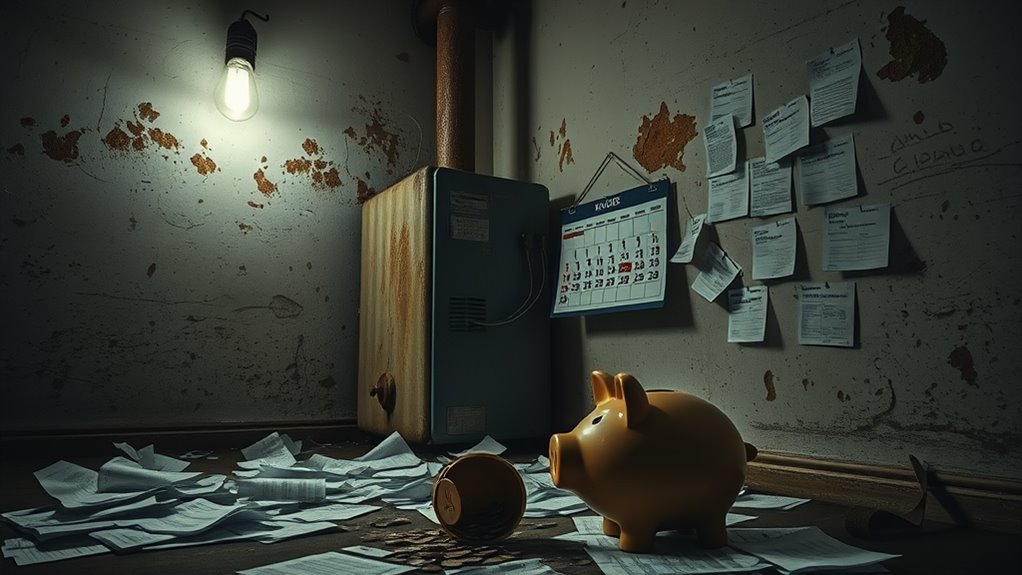
If your boiler isn't registered, you could face considerable financial repercussions that extend beyond immediate repair costs. Ignoring registration can lead to serious financial penalties and compliance costs, impacting your budget greatly. Here are some potential consequences:
- Fines: Regulatory bodies impose hefty financial penalties for operating unregistered boilers, which can add up quickly.
- Increased Insurance Premiums: Insurance companies may raise your premiums or deny coverage altogether, resulting in unexpected expenses.
- Operational Downtime Costs: If your boiler shuts down due to non-compliance, you'll incur costs related to lost productivity and emergency repairs. Additionally, regular updates on building codes are essential to ensure compliance and avoid these financial pitfalls.
Being proactive about registration can save you from these financial implications and guarantee your operations run smoothly.
Frequently Asked Questions
How Can I Check if My Boiler Is Registered?
To check if your boiler is registered, start by reviewing the boiler registration process in your area. You can typically find this information on your local government's website. Verify your boiler's compliance by looking up its registration number or contacting your boiler manufacturer. They can confirm its registration status. Additionally, consider consulting a licensed technician who can assist you in ensuring your boiler meets all necessary regulations and standards.
What Are the Signs of an Unregistered Boiler?
You might notice several signs of an unregistered boiler. To start, check for a lack of certification labels or documentation, as these indicate boiler safety concerns. Unusual noises, frequent breakdowns, or poor heating performance can also signal issues. Additionally, if you're approached by authorities regarding legal consequences, it's vital to act. Ignoring these signs can lead to serious safety risks and potential fines, so always verify your boiler's registration is current.
Can I Register My Boiler After Installation?
Yes, you can register your boiler after installation. To do so, you'll need to follow the boiler registration process, which typically involves providing proof of installation and confirming it meets local installation requirements. Contact the manufacturer or a certified installer for guidance on the specific documentation needed. Completing the registration not only confirms compliance but also helps maintain your warranty and guarantees your boiler's safety and efficiency.
Who Is Responsible for Boiler Registration?
You're responsible for boiler registration to guarantee compliance with legal requirements. This process is essential for maintaining boiler safety and preventing potential hazards. As the owner or operator, you must make certain your boiler is registered with the appropriate authorities. Failing to do so could lead to legal issues and safety risks. Always check your local regulations to verify you're meeting all necessary obligations regarding boiler registration and safety standards.
Are There Exceptions for Registering Certain Boiler Types?
Yes, there are exceptions for registering certain boiler types. Some smaller or specific-use boilers, like those used in residential settings or for temporary heating, might not need to go through the standard registration process. However, regulations can vary by region, so it's essential to check local guidelines. Always make sure you're aware of the requirements for your specific boiler type to avoid any compliance issues in the future.
Summary
In conclusion, not registering your boiler can lead to serious safety hazards, legal issues, and complications with insurance claims. You risk facing substantial financial penalties and may encounter difficulties in maintaining or inspecting the unit properly. To guarantee safety, compliance, and peace of mind, it's essential to register your boiler promptly and keep up with necessary inspections. Don't overlook the importance of registration—protect yourself and your investment by adhering to regulations.

